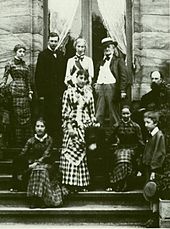Daniela von Bülow
Daniela Senta Thode Freiin von Bülow (born October 12, 1860 in Berlin ; † July 28, 1940 in Bayreuth ) was the daughter of Hans and Cosima von Bülow , stepdaughter of Richard Wagner , wife of the art historian Henry Thode and granddaughter of Franz Liszt .

Life

Daniela von Bülow grew up as the eldest daughter of the conductor Hans von Bülow and his wife Cosima in Berlin . As a child she experienced the alienation between her parents; after their divorce in 1870 she came to live with her mother Cosima, who married Richard Wagner in the same year , with whom she had had a relationship since 1863. From then on she lived first in Tribschen , then in Bayreuth , but kept in touch with her biological father. From Easter 1875 to 1877 she was enrolled in the Luisenstift boarding school near Dresden, the first year of which with her sister Blandine. At times she was under the care of Countess Schleinitz , the close friend of her mother, who had no children herself and whose Berlin salon she frequented. In the eighties she accompanied her stepfather Wagner to Italy , where she met her future husband Henry Thode in Venice . After the wedding in 1886, she lived mainly in Italy, on Lake Garda and Lake Como , until she returned to Bayreuth in 1915 after her divorce from Thode.
Daniela was a talented pianist and looked after her stepfather's memory in Bayreuth, for example in lectures.
On October 19, 1928, she was one of the signatories of the founding manifesto of the Kampfbund for German Culture . She worked as a costume designer at the Bayreuth Festival and was responsible, among other things, for the costumes for the new production of Tristan and Isolde in 1927 (production by Siegfried Wagner , conductor Karl Elmendorff , Gunnar Graarud as Tristan) together with Irma Renheim. On February 13, 1933, she became an honorary citizen of Bayreuth . The seizure of power of Hitler in the same year she got a positive attitude. She became a member of the NSDAP and received the NSDAP's Golden Decoration of Honor before her death . She died in Bayreuth in 1940, almost eighty years old.
Harry Graf Kessler noted about an encounter with Daniela Thode in Bayreuth:
“She attracted me because she practiced a mystical cult with a fanaticism unknown to me, the adoration of her stepfather Richard Wagner. I believe that this kind of mysticism, which not only reinterpreted a person as a superhuman, but also protected against any criticism such as an assassination attempt, was first invented by the Wagnerians. In any case, Daniela Thode was completely saturated with this view, every word she spoke glowed and shone from her. It gave her herself something seductively priestly, magical. "
family
Daniela von Bülow married the art historian Henry Thode (1857–1920) in 1886 . The marriage ended in divorce in 1915 and remained childless.
Daniela's siblings were
- Blandine von Bülow , married. Countess Gravina (1863–1941)
as well as the half-siblings on the mother's side
- Isolde von Bülow , married. Beidler (1865-1919),
- Eva von Bülow , married. Chamberlain (1867–1942) and
- Siegfried Wagner (1869–1930).
See also
literature
swell
- Richard Wagner, Complete Letters , 16 vols., Leipzig 1967–2006.
- Cosima Wagner, Die Tagebücher , Munich 1977.
Secondary literature
- Martin Gregor-Dellin , Richard Wagner - His life, his work, his century , Munich 1980.
- ders., Richard Wagner. A biography in pictures , Munich 1982.
- Brigitte Hamann , The Wagner Family , Reinbek 2005.
- Oliver Hilmes : Cosima's children. Triumph and tragedy of the Wagner dynasty. Siedler Verlag, Munich 2009, ISBN 978-3-88680-899-1 .
Web links
- Literature by and about Daniela von Bülow in the catalog of the German National Library
- Who is who in Bayreuth : private website about the Wagner family.
Individual evidence
- ^ Frank Andert: Wagner children in the Luisenstift. (PDF; 84 kB) Part 63. In: Kötzschenbrodaer stories. September 2013, accessed November 14, 2013 .
- ^ A b Ernst Klee : The cultural lexicon for the Third Reich. Who was what before and after 1945. S. Fischer, Frankfurt am Main 2007, ISBN 978-3-10-039326-5 , p. 612.
- ↑ See Kessler, Faces and Times , Frankfurt / Main 1988, p. 185.
| personal data | |
|---|---|
| SURNAME | Bülow, Daniela von |
| ALTERNATIVE NAMES | Thode, Daniela |
| BRIEF DESCRIPTION | Daughter of Cosima Wagner |
| DATE OF BIRTH | October 12, 1860 |
| PLACE OF BIRTH | Berlin |
| DATE OF DEATH | July 28, 1940 |
| Place of death | Bayreuth |